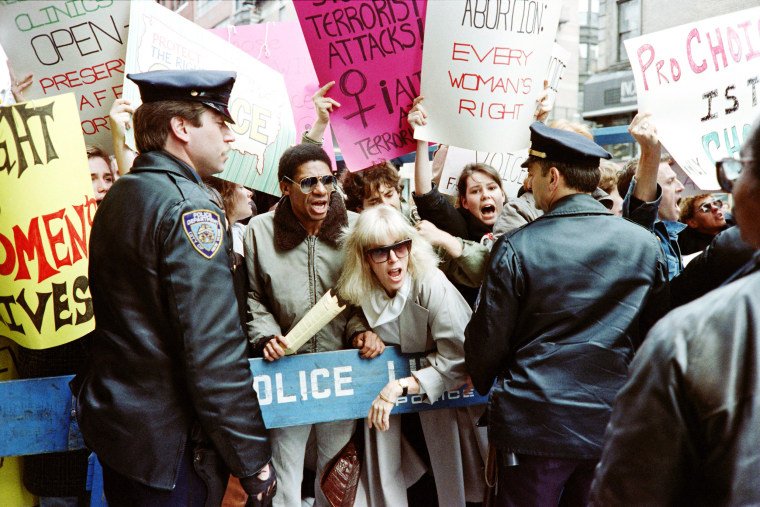The Supreme Court overturned Roe v. Wade on Friday morning, turning the legality of abortion rights over to states to decide. We’ve failed to keep abortion a constitutional right because we’ve made abortion a women’s issue when it is everyone’s issue. It’s time pro-choice advocates change our strategy.
I was 5 in 1973, when the Supreme Court passed Roe. But the decision was never a complete safeguard for women. I grew up watching as state and federal laws restricted access, especially for poor women and women of color. In high school, my mom took me to Washington to the March for Women’s Lives. We chanted, “Keep your laws off my body.”
Men never have to admit how relieved they feel once an abortion is over. They don’t have to worry about being judged irresponsible, a whore or a murderer.
This was a women’s issue, we thought.
And how could it not be? After all, pregnancy was happening to our bodies.
The year before I graduated from college in 1990, the Supreme Court ruled in Webster v. Reproductive Health Services that certain state abortion restrictions were not unconstitutional. As I was becoming an adult, taking control of my life, women’s autonomy was being taken away, state by state. I got pissed. No state lawmaker would tell me what I could do with my body. I took this conviction to the extreme and organized the Reproductive Freedom Ride. In the summer of 1991, I bicycled across the country with a band of activists demanding reproductive justice, including access to safe, legal abortion. We used ourselves, our physical power, as a manifestation of our argument.
We saw, up close, the real-life consequences of restrictions on abortions. In Indiana, we met the parents of Becky Bell, a 17-year-old who died because of a state-enacted parental consent law. Bell felt like she couldn’t tell her religious parents she was pregnant, so she got an abortion on her own, developed an infection and died. In Fargo, North Dakota, we met Dr. Miriam McCreary, who flew in from Minnesota once a week to provide abortions in North Dakota’s lone clinic. She flew around the country providing abortions into her 70s.
Today, parental consent or notification laws are still on the books in Indiana and 36 other states. Doctors have stepped in for McCreary, but there’s still only one abortion clinic in North Dakota. The next closest clinic is in Minnesota, 225 miles away.
We biked, marched and held news conferences. Our message: “We’re biking 4,000 miles to show the world women can and will control our bodies.”

We told men to back off. This was our fight.
But by telling men to shut up, we made a grave error. Women barely held political power, and we let men off the hook. Today, women still don’t hold enough political power. They make up about 51.1% of the population, but just 27% of the U.S. Congress and 31% of state legislatures. We’re still marching, still chanting “Bans Off Our Bodies,” couching this issue as ours alone. We’ve used the same argument for 50 years.
But for every woman seeking an abortion, there’s a man responsible for that unwanted pregnancy. We need them in this fight.
In early May when a draft of the Supreme Court’s decision on Roe was leaked, I was talking to Ida Dupont, one of my fellow Reproductive Freedom Riders, who is now a professor. She was teaching a class on sexuality and reproductive justice and, of course, the possibility of Roe being overturned came up.
She faced her class and said, “Listen, I’m not supposed to say this … “ Then she got nervous. A feeling of shame swept over her because she thought her students would think she did something terrible — though she didn’t think she did.
After giving some statistics on how many women will have an abortion in their lifetime — at least 1 in 4, according to the Guttmacher Institute — she talked about something else. Stalling. Then she said it: “I had a safe, legal abortion. I hope you continue to have that right.”
The class got quiet. Ida felt bold because she said something hard to say out loud. I asked her why she decided to share? “Because stories help people understand each other,” she told me. “Stories can lead to political change.”
As the two of us talked, we got enraged. We Googled “Men’s Abortion Stories,” and it was autocorrected to “Women’s Abortion Stories.” We screamed over the phone like we were at a rally again. We have never seen a man stand up at a pro-choice rally and say, “I’m so glad abortion is legal because I didn’t want to be a father.”
Men never have to admit how relieved they feel once an abortion is over. They don’t have to worry about being judged irresponsible, a whore or a murderer. Women are constantly telling our stories, making us vulnerable. And we should. We need to humanize the experience and let lawmakers — the public — know that abortion affects everyone.
But men should tell their stories for the same reasons. Did birth control fail you? Did you refuse to wear a condom? Did the baby you and your partner were expecting get diagnosed as nonviable? Did you have other plans besides fatherhood when you got her pregnant? How has abortion helped you? I’m talking to men who claim to care about women, men who claim to want to keep abortion safe and legal, and men who benefit from abortion.
These stories hardly exist publicly, but we know they are there. Ida and I created a hashtag to help men tell their stories: #MensAbortionStories. For real change to occur, men need to tell their stories publicly. Men also need to tell these stories to each other. Wherever men talk — in locker rooms, boardrooms, dining rooms, congressional hearing rooms — they need to tell the truth: “My partner had a safe, legal abortion. I hope we continue to have that right.”
Source: | This article originally belongs to Nbcnews.com









